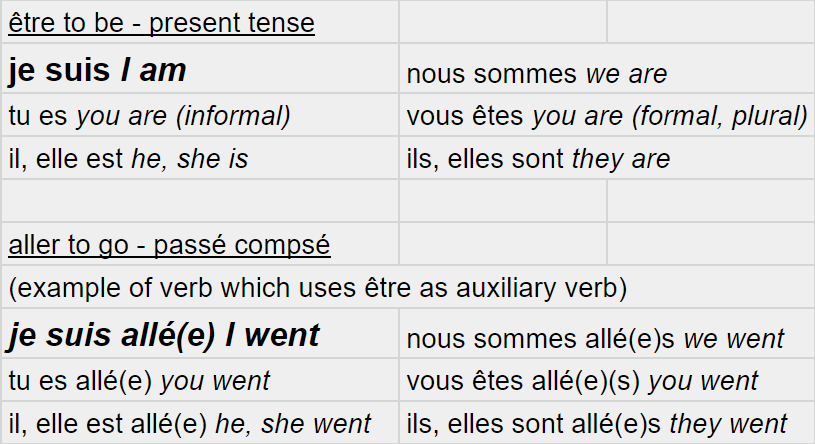How To Use “Je Suis” (I am) In French Conversation

Je suis conjugation
The conjugation of je suis is found in the conjugation of verb être, which means to be.
Je suis is also used in the passé composé of verbs which use être as an auxiliary (helping verb).
For example, “je suis allé(e)” (I went), “je suis venu(e)” (I came) and “Je suis né(e) (I was born). This page covers the passé composé in detail.

Je suis pronunciation
The pronunciation of je suis is juh-swee. This page on Forvo provides several good examples of the pronunciation of je suis.
When je suis is followed by a word that starts with a vowel, a liaison must be made on the final -s of suis, causing it to sound like a -z.
For example, “Je suis(z) en retard” (I’m late) or “Je suis(z) en France” (I’m in France).
How do you use je suis in a sentence?
Je suis is the basis of thousands of French sentences as it translates to “I am”.
Is je suis name correct?
To introduce yourself, saying “je suis + name” is correct. For example, “Je suis Marie” (I’m Marie) or “Je suis Pierre” (I’m Pierre).
However, the other common way to say “my name is” in French is: “Je m’appelle“, which literally means “I call myself”. Another translation of “Je m’appelle” is “my name is).
Therefore, you can also say: “Je m’appelle Marie” (My name is Marie) or “Je m’appelle Pierre” (My name is Pierre).

Je suis + adjective
In order to say “I am + adjective”, for example “I am happy”, use je suis followed by the adjective in the masculine or feminine form.
This page covers the masculine and feminine agreement rules of French adjectives in detail.
Je suis desolé
“Je suis désolé(e)” means I’m sorry in French. Add an extra -e for agreement with a female speaker.

Je suis américain
“Je suis américain(e)” means I’m American. To say your nationality, say je suis + nationality adjective in the masculine or feminine form.
This page covers words for over 100 nationalities in detail.
Je suis chez moi
“Je suis chez moi” means “I’m at home”. To say “I’m home” you can also also say, “Je suis à la maison”.
This page offers a complete explanation of the preposition chez, which means “at the place or home of”.
Je suis fatigué
“Je suis fatigué(e)” means I’m tired. The French word, fatigué is related to the English word fatigue.

Je suis au travail
Je suis au travail means “I’m at work”. The word “au” is a contraction of à + le, which means “at the”.
Je suis beau, belle
Use “je suis” to describe your physical appearance. For example, “Je suis beau” (I’m handsome) or “Je suis belle” (I’m beautiful).
This page covers vocabulary for physical appearances and descriptions.
Je suis content
There are two ways to say I’m happy in French: “Je suis content(e)” and “Je suis heureux/heureuse”.
Je suis occupé
“Je suis occupé(e)” means I am busy.
When describing having a busy week, make yourself the subject of the sentence. “Je suis tres occupé(e) cette semaine”. Translations include “I’m very busy this week” or “I’m having a busy week”.
Je suis ravi, enchanté
“Je suis ravi(e) de vous connaître” and “Je suis enchanté(e) de vous connaître” both mean nice to meet you in French.

Common expressions with je suis
Je suis is used in many common expressions. This page explains lots of usages of être.
Je suis d’accord
“Je suis d’accord” means I agree. This page offers a complete explanation of the word d’accord.
Je suis en train de
“Je suis en train de + infinitive” is used to express the present continuous tense. For example, “Je suis en train de travailler” (I am working).
This page explains “être en train de“, which is used to express, “to be in the middle of doing something”.

Je suis encore
“Je suis encore” translates to “I am still”. For example, “Je suis encore au travail” (I’m still at work).
Je suis de retour
“Je suis de retour” translates to “I’m back”. For example, “Salut tout le monde! Je suis de retour!” (Hi everybody! I’m back!).
Common mistakes with je suis
Several common mistakes can be made with “je suis”.
Je suis très bien
Do not say “je suis très bien” for “I’m doing very well”. To express how you’re doing, use the verb aller (to go). “Je vais très bien” (I’m doing very well).
This page covering French greetings covers several ways to say how you’re doing.
Je suis faim
To say “I’m hungry”, do not say “Je suis faim”. The expression requires the usage of avoir (to have). I’m hungry in French is “J’ai faim”.

Je suis soif
This same rules applies for “I’m thirsty”. Do not say, “Je suis soif”. Say, “J’ai soif” (I’m thirsty).
Je suis interessé
In order to express what you’re interested in, do not say “Je suis interessé(e)”.
Use the verb “s’interesser à”. For example, “Je m’interesse au franàais” (I’m interested in French).
Conclusion
After having read this page, we hope you’ve discovered and understood the many uses of “je suis” in the French language! We hope this lesson has helped!
Related lessons:
- Ça Va Meaning
- Bonjour meaning
- Au revoir meaning
- Voulez-vous meaning
- Je ne sais pas meaning
- Je voudrais meaning
